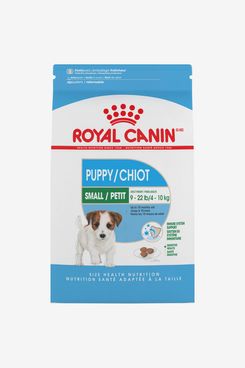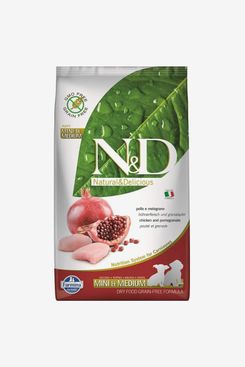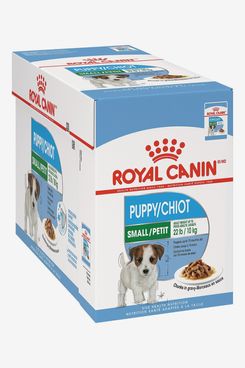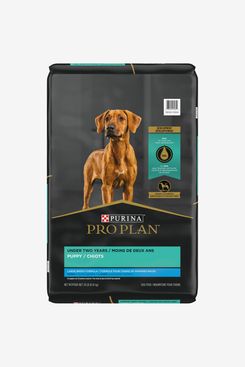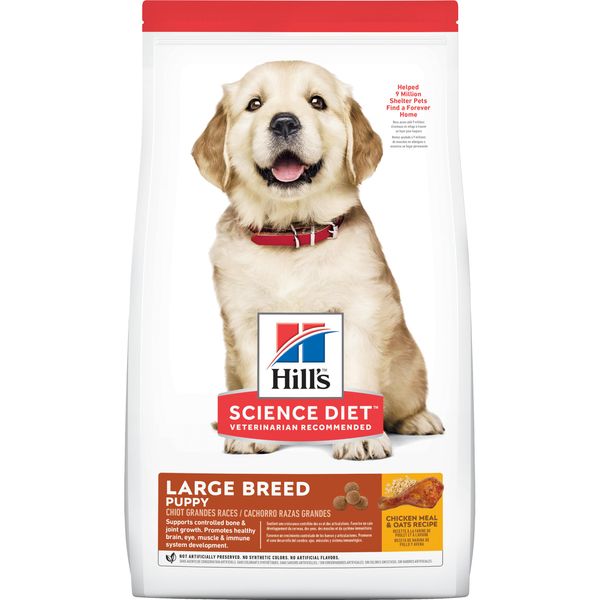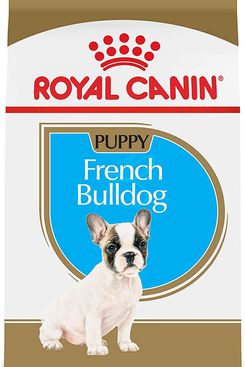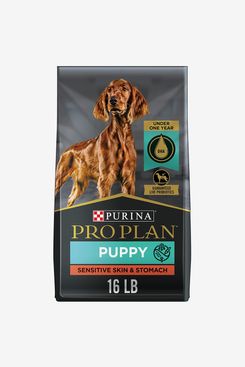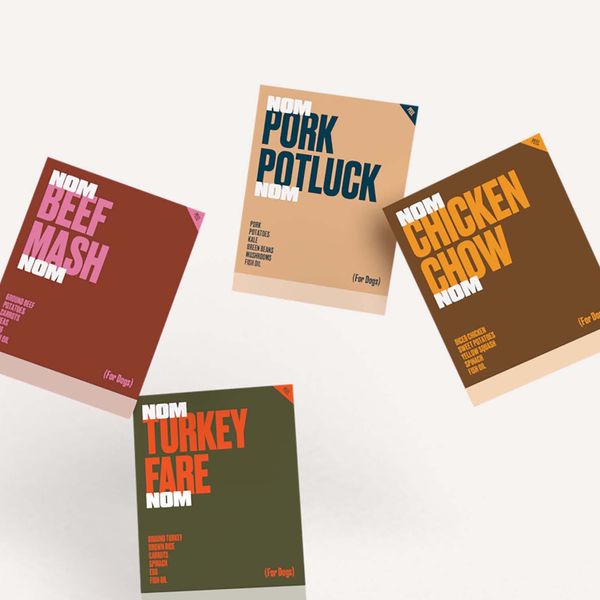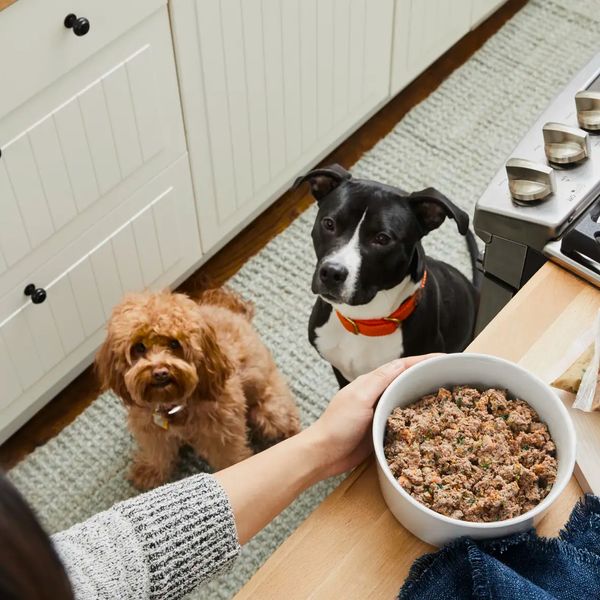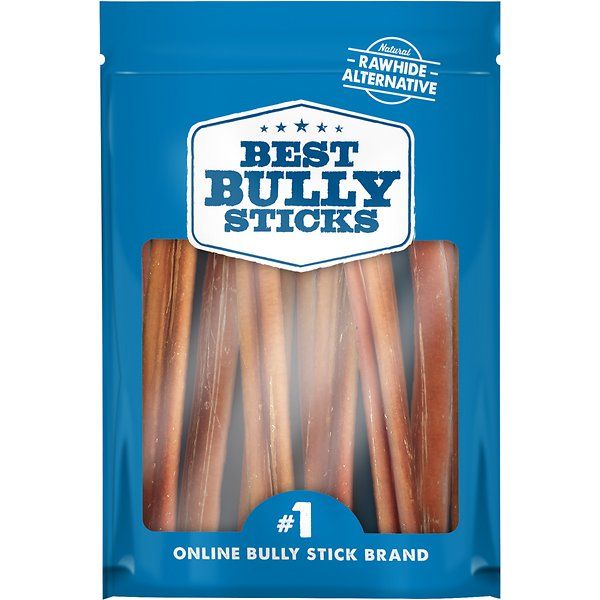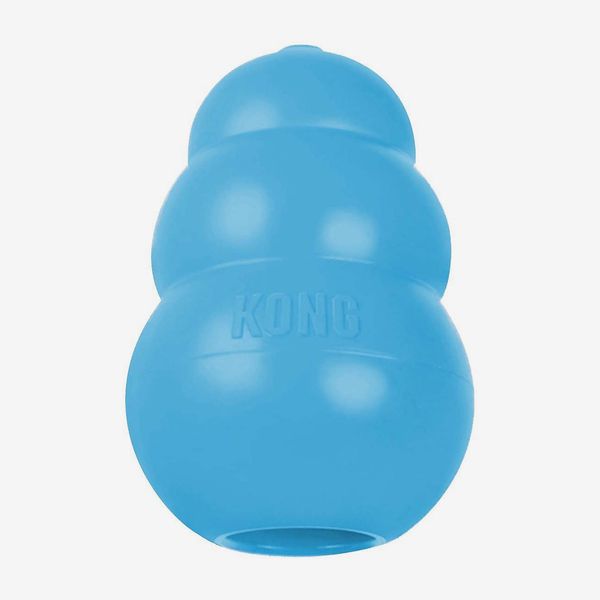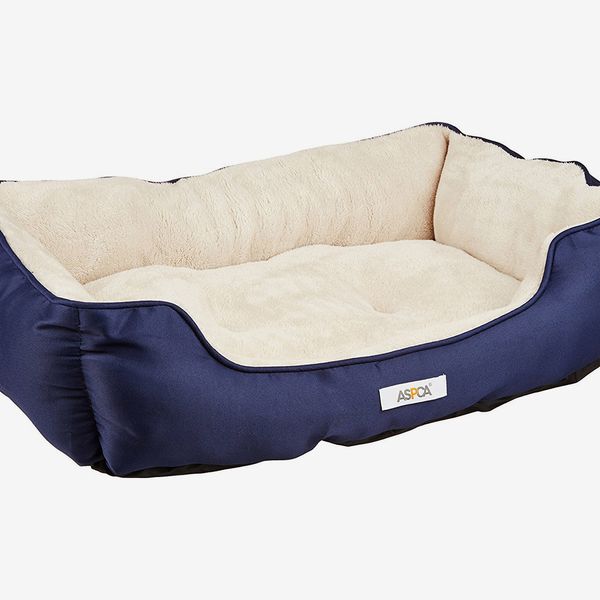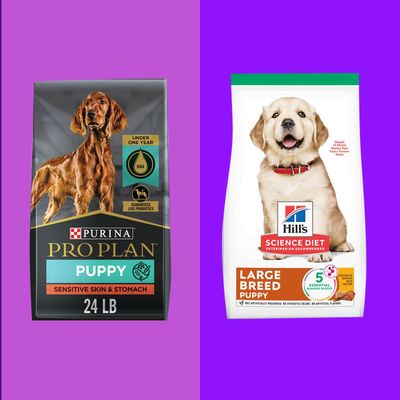
In this article
If you’ve ever brought a new puppy home, you know how much fun it can be. Everything about them is cute — from the way they waddle around the house and tip over to the look on their face when they’re about to fall asleep — plus their paws smell like tortilla chips. But owning a puppy also leads to a million questions. You’ll wonder what’s okay to let them eat. Grass? A little. Your roommate’s CBD gummies? Definitely not. CBD for dogs? Maybe, after talking with your vet. And just know that they’re gonna try to eat another animal’s poop. (It’s okay if you don’t catch them in time. They can handle it.)
One question you should definitely know the answer to before bringing your puppy home is what dog food you’re going to feed them. And because there are hundreds of different brands to sort through — and a lot of strong opinions on the subject — the decision can be complicated. To help you narrow the field, we asked ten experts, including veterinarians, animal specialists, and dog owners, to help us find the best of the bunch for all kinds of puppies.
What we’re looking for
Nutrition
“What to feed your puppy is a question I get almost every single day,” says Dr. Karie Anne Johnson, a mobile veterinarian and co-founder of VIP Vet Visit. She and the other vets we spoke to all recommend choosing puppy food that has been thoroughly researched and tested for nutritional adequacy by the Association of American Feed Control Officials and meets the organization’s standards. All of the puppy food recommended below meets or exceeds AAFCO standards.
Puppies have different dietary requirements compared with adult dogs, says Dr. Jamie Richardson, chief of staff at Small Door Veterinary in NYC. They need higher levels of protein and certain vitamins and minerals. Because of this, Richardson recommends feeding them a formulation that is specific to puppies until they are skeletally mature — around one year for small- and medium-breed dogs or between 14 and 18 months in large- and giant-breed dogs. Richardson suggests you confirm the packaging specifies that the diet “meets the nutritional profiles for growth or all life stages.” As for the ingredients list, veterinarian Dr. Shelly Zacharias, vice-president of medical affairs for Gallant, says the puppy food you choose should contain some sort of grain because grain-free diets have been linked to an increased risk of a heart disease called dilated cardiomyopathy, especially in large-breed dogs. Meanwhile, Zacharias stresses the list should name the exact type of meat included (instead of “meat” or “meat by-products”) and should not contain white flour or preservatives such as BHA or BHT, propylene glycol, or rendered fat. We made sure all the foods on this list are specially formulated for puppies, and we’ve noted the first four ingredients of each to make comparison shopping easier.
Breed size
Large- and giant-breed puppies like malamutes, Great Danes, German shepherds, and Saint Bernards have different dietary needs than, say, a Yorkshire terrier or dachshund puppy. Veterinarian Dr. Leslie Brooks, an adviser at Betterpet, says large-breed puppies should eat food that is specifically labeled for “large-breed puppies.” According to Brooks, the mineral and calorie content in those foods is tailored to prevent large-breed puppies from growing too fast and developing bone or joint abnormalities as they grow.
When it comes to small and toy dog breeds, the main difference in their food, Richardson says, is that it’s made in smaller chunks. Because little dogs have smaller mouths and teeth, you want to give them something that’s easy for them to bite and chew. But that’s not the only reason to get food made specifically for small-breed puppies. According to Zacharias, small-breed puppy food also has nutrient differences that are important for small dogs.
Wet or dry food
For some dog owners, the decision to feed their puppy a wet-food diet rather than a dry-food diet is one of convenience and personal preference. But if you have a puppy who’s reluctant to drink enough water, serving them wet food can be a sneaky way to help them stay hydrated.
If you’re among the people who see their dog more as a member of their family than as a pet, you may want to give them minimally processed food that looks more like your own dinner than traditional kibble. Richardson says a growing number of pet owners are interested in human-grade or fresh pet foods. While definitions vary by brand, generally speaking, “fresh pet food” is minimally processed, does not use preservatives, and is gently cooked to retain nutrients and reduce the risk of harmful bacteria present in some raw diets. Like meals that come in a can, fresh and human-grade foods are considered to be in the wet-food category since they retain moisture. (It’s important to note that they usually come frozen and need to be thawed before serving.)
Best dry food for small-breed puppies
Nutrition: First ingredients are chicken by-product meal, brewers rice, chicken fat, and wheat gluten | Breed size: Small breed | Wet or dry food: Dry food
Three of the vets we consulted recommend Royal Canin puppy foods. Zacharias raised six of her own dogs on Royal Canin, and Dr. Sara Ochoa, a Texas-based veterinarian and a veterinary consultant for doglab.com, likes the brand because it is specifically formulated not only for a dog’s size but also for certain breeds, such as Chihuahuas or French bulldogs (more on that below). If your small dog’s breed is a bit of a mystery, Royal Canin also makes food for small, medium, and large puppies that isn’t specific to their breeds.
Best (less expensive) dry food for small-breed puppies
Nutrition: First ingredients are boneless chicken, dehydrated chicken, whole spelt and oats | Breed size: Small breed | Wet or dry food: Dry food
Richardson says the Italian brand Farmina is a great choice for puppies. Not only does the company use high-quality ingredients, it also works directly with an Italian veterinary nutritionist to create foods formulated to the highest of standards, whereas many other brands simply formulate their food based on information found in existing studies. Also, this dry food is clinically tested to have a low glycemic index, which helps your puppy get all the nutrients it needs.
Best wet food for small-breed puppies
Nutrition: First ingredients are water, pork by-products, chicken, and chicken by-products | Breed size: Small breeds | Wet or dry food: Canned wet food
In addition to recommending small-size kibble for little dogs, Zacharias suggests exposing young dogs of all sizes to both wet and dry foods to help them develop a taste for both. “This helps prevent having a picky pet who doesn’t like one or the other,” she says. Plus, if a specific health condition dictates one or the other type of food, you won’t have a hard time introducing it, she says. “I personally mix dry kibble with a little canned, so they get the benefit of the added moisture,” says Zacharias. This wet food is for small breeds, but Royal Canin also makes wet food for medium- and large-breed dogs.
Best food for large-breed puppies
Nutrition: First ingredients are chicken, rice, corn gluten meal, and whole grain corn | Breed size: Large breeds | Wet or dry food: Dry food
Four of the veterinarians we talked to recommended Purina Pro Plan puppy foods for large breeds because all of the company’s foods for specialized diets have been researched and tested by veterinary nutritionists. Johnson also likes that Purina stands by its food and does not shy away from issuing voluntary recalls. “This means they test their product often and only allow food on the shelves if it passes their strict quality-control measures,” she says. Purina Pro Plan Focus is typically a hit with most puppies, she says. Even the pickiest eaters.
Best (less expensive) food for large-breed puppies
Nutrition: First ingredients are chicken, brown rice, whole grain oats, and chicken meal | Breed size: Large breeds | Wet or dry food: Dry food
Hill’s Science Diet comes recommended by three of the experts we spoke to, including veterinarian Dr. Jessica Kirk, who likes that “this food has gone through AAFCO feeding trials, is readily available at many pet-supply stores, and is affordable to most puppy owners.” Whichever large-breed-puppy dog food you buy, Kirk suggests making sure it has been tested in AAFCO feeding trials as opposed to simply having been designed using AAFCO guidelines. “The wording on the packaging can be misleading,” she warns.
Best food for purebred French-bulldog puppies
Nutrition: First ingredients are brewers’ rice, chicken by-product meal, wheat gluten, and wheat | Breed size: Medium breed | Wet or dry food: Dry food
As the name suggests, this dry food from Royal Canin is formulated to meet the unique nutritional needs of a purebred French-bulldog puppy, says Rifruf co-founder Peter Liu, who raised his dog Caesar on it. Liu says the breed-specific food soothed his pup’s sensitive stomach — a common issue in brachycephalic (i.e., short-nosed) dogs like Frenchies — because the formula contains easy-to-digest protein and the kibble is U-shaped, which makes picking up and chewing the food simpler with the breed’s short muzzle and underbite. While Caesar’s breeder originally recommended the brand, Liu says a veterinarian approved the diet until the dog transitioned to adult food at around 12 months old.
Best food for puppies with sensitive stomachs
Nutrition: First ingredients are salmon, rice, barley, and fish meal | Breed size: All breed sizes | Wet or dry food: Dry food
Dr. Chyrle Bonk, a veterinarian with the pet-health website Doggie Designer, is also a fan of Purina Pro Plan — the brand she “raised my last two puppies on” — and recommends this food in particular for puppies with sensitive stomachs. “It is a good-quality food made with real meat and probiotics to help nourish and regulate those developing tummies,” Bonk explains. She notes that the size of the dry kibble is “just right for any mouth, no matter how small,” adding that the food is generally easy to find.
Best human-grade food for puppies
Nutrition: First ingredients are ground beef, russet potatoes, eggs, carrots, and peas | Breed size: All breed sizes | Wet or dry food: Frozen wet food
According to Richardson, many of the fresh pet food brands on the market currently don’t sell food specifically formulated for puppies. She’s also cautious about fresh pet foods because they tend to contain a higher fat content than other dog foods. Still, if you’re looking to go the fresh-food route, Richardson recommends the subscription brand Nom Nom (the direct-to-consumer brand was recently purchased by Mars Petcare with plans to integrate it into its Royal Canin division). Nom Nom has two board certified veterinary nutritionists on staff who create diets that follow AAFCO standards. To order, you fill out a survey about your pet’s breed, age, activity level, and weight goals. “There are not a lot of other companies who do that,” she says. Nom Nom plans start at $2.40 a day for the smallest breeds with few dietary restrictions. If you want to try before you subscribe, you can buy a variety pack with four of the brand’s foods for a flat $20.
Best (less expensive) human-grade food for puppies
Nutrition: First ingredients are chicken liver, Brussels sprouts, and cabbage | Breed size: All breed sizes | Wet or dry food: Frozen wet food
Veterinarian Dr. Joe Martins of Belle Mead Animal Hospital is another fan of fresh-food diets. “The best foods for puppies are breed- and size-specific foods that are gently cooked with fresh, natural protein, vegetables like carrots, and added fatty acids, providing higher critical levels of EPA and DHA that puppies need in their most critical developmental age, which starts at six to nine weeks,” he says.
If you want to try a (slightly) cheaper option, homeopathic veterinarian Dr. Christina Chambreau recommends the Farmer’s Dog, which also makes its food using fresh meat and vegetables. (That food, according to the brand, exceeds AAFCO recommendations for nutritional value.) Like Nom Nom, the company asks each customer to fill out a series of questions about their dog’s age, breed, and weight as well as any food concerns they might have. Each diet — chicken, turkey, beef, or pork — is customized to your dog and shipped to your house, ready to serve. According to the Farmer’s Dog, their plans start at around $2 a day for the smallest dogs with few dietary restrictions — but the actual cost of any plan will depend on the specific information you provide when signing up.
Some more Strategist-approved products for puppies
Our experts
• Dr. Chyrle Bonk, a veterinarian with the pet-health website Doggie Designer
• Dr. Leslie Brooks, veterinarian and adviser at Betterpet
• Dr. Christina Chambreau, homeopathic veterinarian
• Dr. Karie Anne Johnson, a mobile veterinarian and co-founder of VIP Vet Visit
• Dr. Jessica Kirk, veterinarian
• Peter Liu, co-founder of Rifruf
• Dr. Joe Martins, a veterinarian at Belle Mead Animal Hospital
• Dr. Sara Ochoa, a Texas-based veterinarian and a veterinary consultant for doglab.com
• Dr. Jamie Richardson, chief of staff at Small Door Veterinary
• Dr. Shelly Zacharias, veterinarian and vice-president of medical affairs for Gallant
The Strategist is designed to surface the most useful, expert recommendations for things to buy across the vast e-commerce landscape. Some of our latest conquests include the best acne treatments, rolling luggage, pillows for side sleepers, natural anxiety remedies, and bath towels. We update links when possible, but note that deals can expire and all prices are subject to change.
